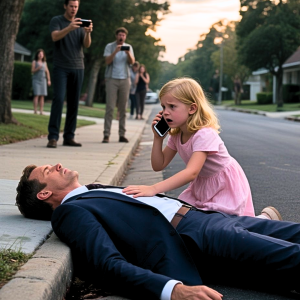
The marble lobby of Riverside Bank & Trust gleamed under the morning sun as Madeleine Voss entered with her usual precision. She was the youngest CEO in the company’s long history and wore that title like a crown. Every move she made was deliberate, every smile practiced. To her, success meant control, and control meant never letting sentiment cloud judgment.
That morning, an elderly Black man stepped into the branch. His coat was neatly buttoned but clearly worn from years of use, and his shoes had long lost their shine. He approached the counter with quiet dignity, holding a small leather notebook and an identification card.
“Good morning,” he said politely. “I’d like to withdraw seventy-five thousand dollars from my account.”
The teller blinked in surprise. Before she could respond, Madeleine happened to pass by. Her sharp heels echoed on the tile as she stopped and looked him over.
“Sir,” she said coolly, “this is a private client division. Are you sure you’re in the correct branch?”
The man gave a calm nod. “I have been a client here for nearly three decades.”
Madeleine folded her arms. “That is difficult to believe without proof. We have strict security policies. You should probably visit one of our public branches. We cannot approve such a request on appearance alone.”
The lobby fell silent. The man’s eyes flickered with quiet hurt, but he said nothing. “I can bring additional documents from my car,” he offered.
When he returned moments later, two security guards were standing beside Madeleine. Her voice was cold. “Sir, you may leave now. We cannot allow disruptive or suspicious activity in this office.”
The man exhaled slowly. “You are making a serious mistake,” he said, then turned and walked out. The guards followed him to the door. Madeleine, feeling proud of her own firmness, told the staff, “This is how you protect a financial institution.”
She could not have known that by evening, she would lose everything that speech had been meant to prove.
By noon, Madeleine sat in her glass-walled office preparing for the most important deal of her career. She had spent months arranging a merger worth over three billion dollars with Davenport Global Holdings, one of the world’s largest investment firms. The company’s chairman, Mr. Harold Davenport, was said to be discreet and traditional, a man who valued character as much as numbers.
Her assistant entered the room. “Mr. Davenport has arrived,” she said.
Madeleine stood, smoothing her blazer. “Excellent. Please send him in.”
The door opened, and in walked the same elderly man she had thrown out that morning.
For a moment, neither spoke. Madeleine’s confident smile faded as her heart began to pound.
“Good afternoon, Ms. Voss,” he said calmly. “I believe we have met already.”
Her mouth went dry. “Mr. Davenport… I— I did not realize—”

He opened the small notebook she had seen earlier and placed it on her desk. “I came this morning to see how your institution treats ordinary customers. I wanted to know if respect is given only to those who appear wealthy.” He paused, his voice quiet but firm. “I have my answer.”
“Please,” she began, “if I had known—”
He raised a hand gently. “You should not need to know who someone is to treat them with dignity. My company does not invest in arrogance, Ms. Voss. We invest in humanity.”
He closed the notebook, stood, and offered a brief handshake. “Good day, Ms. Voss. I will be placing our investment elsewhere.”
When he left, the room seemed to grow smaller. Madeleine stared at the empty chair, her pulse echoing in her ears. Minutes later, the calls began. The board demanded answers, the press caught wind of the failed merger, and the bank’s stock began to fall before the day ended.
By nightfall, Madeleine sat in her office watching the city lights blur through her tears. On her desk lay the business card Mr. Davenport had left behind.
Harold Davenport, Chairman, Davenport Global Holdings
Beneath it, in delicate handwriting, were six words:
“Respect is the highest form of wealth.”
The next morning, headlines filled the financial papers. The deal was gone. Shareholders were furious. Within a week, Madeleine was asked to step down “in the best interests of the institution.” Her portrait was quietly removed from the lobby wall.
Across the city, Mr. Davenport donated half a million dollars to a fund providing small business loans for underprivileged entrepreneurs. When asked about the canceled merger, he simply said, “Money should never be trusted to those who cannot value people.”
Months later, Madeleine began volunteering at a community financial center. She introduced herself only as “Maddie.” Few recognized her as the former banking prodigy who had once commanded glass towers and billion-dollar deals. She taught senior citizens how to use online accounts, explained budgeting to young parents, and listened to stories from people who had spent their lives feeling unseen.
One afternoon, while helping a retired teacher fill out a form, she overheard another volunteer tell a story. “Did you ever hear about the billionaire who tested a banker by pretending to be poor? He said the true worth of a leader is measured in kindness.”
Madeleine felt her throat tighten. She smiled faintly but said nothing. Some lessons, she realized, were meant to stay quiet.
And somewhere across the skyline, in a high-rise office filled with soft morning light, Harold Davenport looked out over the city and smiled. He had not destroyed her. He had given her something no business deal ever could: a conscience reborn.
Because in the end, power fades, money moves, and reputations crumble. But respect, once given freely, lasts longer than any fortune.




